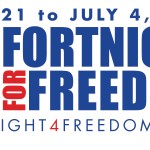This morning’s reflection in Magnificat magazine, that great daily reliable resource for the soul, comes from Dignitatis Humanae, Vatican Council II’s declaration on religious freedom:
The religious acts whereby men, in private and in public and out of a sense of personal conviction, direct their lives to God transcend by their very nature the order of terrestrial and temporal affairs. Government therefore ought indeed to take account of the religious life of the citizenry and show it favor, since the function of government is to make provision for the common welfare. However, it would clearly transgress the limits set to its power, were it to presume to command or inhibit acts that are religious.
The freedom or immunity from coercion in matters religious which is the endowment of persons as individuals is also to be recognized as their right when they act in community. Religious communities are a requirement of the social nature both of man and of religion itself.
Provided the just demands of public order are observed, religious communities rightfully claim freedom in order that they may govern themselves according to their own norms, honor the Supreme Being in public worship, assist their members in the practice of the religious life, strengthen them by instruction, and promote institutions in which they may join together for the purpose of ordering their own lives in accordance with their religious principles.
Religious communities also have the right not to be hindered, either by legal measures or by administrative action on the part of government, in the selection, training, appointment, and transferal of their own ministers, in communicating with religious authorities and communities abroad, in erecting buildings for religious purposes, and in the acquisition and use of suitable funds or properties.
Perhaps take particular note of this:
Religious communities also have the right not to be hindered in their public teaching and witness to their faith, whether by the spoken or by the written word. However, in spreading religious faith and in introducing religious practices everyone ought at all times to refrain from any manner of action which might seem to carry a hint of coercion or of a kind of persuasion that would be dishonorable or unworthy, especially when dealing with poor or uneducated people. Such a manner of action would have to be considered an abuse of one’s right and a violation of the right of others.
This is a Church that serves because of who it is, because of who we are called to be. Its service is as welcome as its existence has been to the health of a society. And this current, ongoing redefinition of religious liberty, puts all this at risk — absolutely needlessly.
Cardinal Wuerl talked about just this in reference, in particular, to some of the poorest schoolchildren in the District of Columbia, just recently, during the Fortnight, in an interview with me.
The reflection in Magnificat went on, by the way, but so does the document, which you can read here. Or catch up on some of the excerpts and reflections for the Fortnight.











